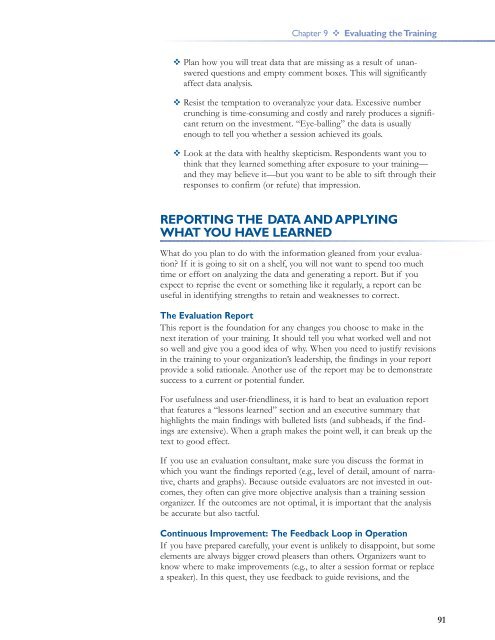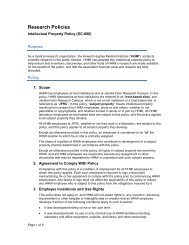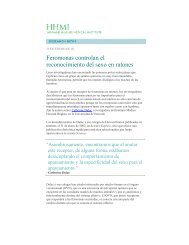Training Scientists to Make the Right Moves - Howard Hughes ...
Training Scientists to Make the Right Moves - Howard Hughes ...
Training Scientists to Make the Right Moves - Howard Hughes ...
Create successful ePaper yourself
Turn your PDF publications into a flip-book with our unique Google optimized e-Paper software.
Chapter 9 Evaluating <strong>the</strong> <strong>Training</strong><br />
Plan how you will treat data that are missing as a result of unanswered<br />
questions and empty comment boxes. This will significantly<br />
affect data analysis.<br />
Resist <strong>the</strong> temptation <strong>to</strong> overanalyze your data. Excessive number<br />
crunching is time-consuming and costly and rarely produces a significant<br />
return on <strong>the</strong> investment. “Eye-balling” <strong>the</strong> data is usually<br />
enough <strong>to</strong> tell you whe<strong>the</strong>r a session achieved its goals.<br />
Look at <strong>the</strong> data with healthy skepticism. Respondents want you <strong>to</strong><br />
think that <strong>the</strong>y learned something after exposure <strong>to</strong> your training—<br />
and <strong>the</strong>y may believe it—but you want <strong>to</strong> be able <strong>to</strong> sift through <strong>the</strong>ir<br />
responses <strong>to</strong> confirm (or refute) that impression.<br />
REPORTING THE DATA AND APPLYING<br />
WHAT YOU HAVE LEARNED<br />
What do you plan <strong>to</strong> do with <strong>the</strong> information gleaned from your evaluation?<br />
If it is going <strong>to</strong> sit on a shelf, you will not want <strong>to</strong> spend <strong>to</strong>o much<br />
time or effort on analyzing <strong>the</strong> data and generating a report. But if you<br />
expect <strong>to</strong> reprise <strong>the</strong> event or something like it regularly, a report can be<br />
useful in identifying strengths <strong>to</strong> retain and weaknesses <strong>to</strong> correct.<br />
The Evaluation Report<br />
This report is <strong>the</strong> foundation for any changes you choose <strong>to</strong> make in <strong>the</strong><br />
next iteration of your training. It should tell you what worked well and not<br />
so well and give you a good idea of why. When you need <strong>to</strong> justify revisions<br />
in <strong>the</strong> training <strong>to</strong> your organization’s leadership, <strong>the</strong> findings in your report<br />
provide a solid rationale. Ano<strong>the</strong>r use of <strong>the</strong> report may be <strong>to</strong> demonstrate<br />
success <strong>to</strong> a current or potential funder.<br />
For usefulness and user-friendliness, it is hard <strong>to</strong> beat an evaluation report<br />
that features a “lessons learned” section and an executive summary that<br />
highlights <strong>the</strong> main findings with bulleted lists (and subheads, if <strong>the</strong> findings<br />
are extensive). When a graph makes <strong>the</strong> point well, it can break up <strong>the</strong><br />
text <strong>to</strong> good effect.<br />
If you use an evaluation consultant, make sure you discuss <strong>the</strong> format in<br />
which you want <strong>the</strong> findings reported (e.g., level of detail, amount of narrative,<br />
charts and graphs). Because outside evalua<strong>to</strong>rs are not invested in outcomes,<br />
<strong>the</strong>y often can give more objective analysis than a training session<br />
organizer. If <strong>the</strong> outcomes are not optimal, it is important that <strong>the</strong> analysis<br />
be accurate but also tactful.<br />
Continuous Improvement: The Feedback Loop in Operation<br />
If you have prepared carefully, your event is unlikely <strong>to</strong> disappoint, but some<br />
elements are always bigger crowd pleasers than o<strong>the</strong>rs. Organizers want <strong>to</strong><br />
know where <strong>to</strong> make improvements (e.g., <strong>to</strong> alter a session format or replace<br />
a speaker). In this quest, <strong>the</strong>y use feedback <strong>to</strong> guide revisions, and <strong>the</strong><br />
91
















